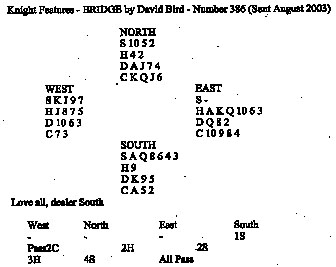|
Bridge
 The
higher a contract
is, the easier it usually is to play. Imagine for a moment that you
were in 6S. How would you play the contract when the defenders led two
rounds of hearts? You would ruff the second heart, cross to dummy and
finesse the queen of trumps. The only chance would be to find East
with a doubleton king of trumps. With just 24 points between the
hands, it is more likely that you would end in a humble game contract.
Now your aim is to make the game safe against an adverse distribution
of the cards. How would you play the contract when the defenders again
launch the defence with two rounds of hearts? The original declarer
gave the matter insufficient attention. After ruffing the second
heart, he played the ace of trumps, East showing out. When he
continued with a low trump towards dummy’s ten, West stepped in with
a jack. Can you see what the winning defence was now? West played a
third round of hearts, deliberately giving a ruff-and discard. If
declarer ruffed with the dummy’s bare 10, West’s K-9 would be
worth two further tricks. If instead declarer ruffed in his hand, he
would be down to the same number of trumps as West and would lose
trump control when he knocked out the trump king and was forced again.
The only safe line is to lead a trump towards the 10 at Trick 2. You
then have a small trump left in dummy to deal with a third round of
hearts. The
higher a contract
is, the easier it usually is to play. Imagine for a moment that you
were in 6S. How would you play the contract when the defenders led two
rounds of hearts? You would ruff the second heart, cross to dummy and
finesse the queen of trumps. The only chance would be to find East
with a doubleton king of trumps. With just 24 points between the
hands, it is more likely that you would end in a humble game contract.
Now your aim is to make the game safe against an adverse distribution
of the cards. How would you play the contract when the defenders again
launch the defence with two rounds of hearts? The original declarer
gave the matter insufficient attention. After ruffing the second
heart, he played the ace of trumps, East showing out. When he
continued with a low trump towards dummy’s ten, West stepped in with
a jack. Can you see what the winning defence was now? West played a
third round of hearts, deliberately giving a ruff-and discard. If
declarer ruffed with the dummy’s bare 10, West’s K-9 would be
worth two further tricks. If instead declarer ruffed in his hand, he
would be down to the same number of trumps as West and would lose
trump control when he knocked out the trump king and was forced again.
The only safe line is to lead a trump towards the 10 at Trick 2. You
then have a small trump left in dummy to deal with a third round of
hearts.
Answer
 You opened this 11-count
because of the excellent spades and it is best to limit the hand with
a 2S rebid. If partner continues with 2NT, you can bid 3H then to show
a weak 6-4 hand. The problem with rebidding 2H is that this is usually
played as forcing, opposite a two-level response. Partner may carry
you too high when he would have passed 2S. AWARDS:2S-10, 2H-8. You opened this 11-count
because of the excellent spades and it is best to limit the hand with
a 2S rebid. If partner continues with 2NT, you can bid 3H then to show
a weak 6-4 hand. The problem with rebidding 2H is that this is usually
played as forcing, opposite a two-level response. Partner may carry
you too high when he would have passed 2S. AWARDS:2S-10, 2H-8.
David Bird
— Knight Features
|